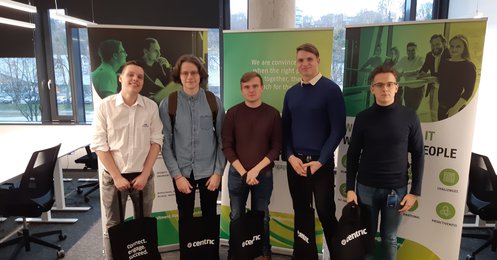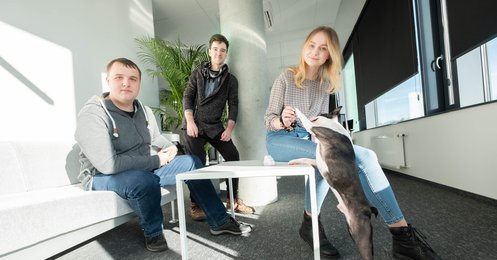Job interviews still exist
When it comes to career opportunities, talent is sometimes scouted even in unusual places such as social networks like Tinder or TikTok. These seem to be early, experimental processes in Lithuania, and whilst employers are trying new platforms to source employees, everyone is still using classic job interviews.
People are often only invited to their first job interview following graduation and it is important to find out how best to represent oneself, how to share information about oneself and how best to describe one’s strengths.
It is noticeable, especially when participating in university career days and interview simulations, that the majority of students do not know how to create their CVs correctly, often making mistakes that can be corrected very easily. Also, first impressions count. It is too late to create a new impression of yourself if, during the initial interview with a prospective employer, you missed the mark in properly connecting, didn’t create the correct impression of yourself or did not effectively convey your ambitions and motivation.
It is necessary to do homework
In order for the job-search process to be a smoother one, and for the job interview to prove successful, you will need to be well prepared. Follow the tips below to more broadly help to open the door to the job market.
- Homework. Find out in advance about the organisation for which you would like to work or complete an internship. When asked what candidates know about the organisation to which they are applying, it is not uncommon to hear answers such as "nothing" to "I haven’t had an opportunity to find out". Such responses give the impression to the employer that the candidate is not sufficiently motivated, does not know why they attended the interview, and may have indiscriminately sent out their CV to many companies in the hope that one might invite them for interview. Before the interview it is always recommended to look at the official website of the organisation and to find out more about it using social media networks. In this way, you will not only have a solid foundation of understanding regarding the operations of the company in which you are interested, but you will also determine what culture prevails and what additional activities the employees are engaged in within the company.
- Motivation. This is one aspect that is very often taken into account during a conversation. Think from an employer’s perspective of how it appears when a candidate, during an interview, shows no sign of being motivated to join an organisation for an internship or to start a new job. Such a candidate will not inspire much confidence. So, it is important to show interest both in the organisation itself and in the specifics of the job itself as well. Also, it is appropriate to share aspects about your additional activities that would be at least partially related to the position for which you are applying. For example, if you are applying for an IT position, you may be able to share that you have additional programming experience, (not just that gained at university,) or created an interesting IT solution. If you are participating in a selection for a customer service position, then you can share where you have used your communication competencies (in volunteer programs, university offices, etc.).
- Openness. Quite often, candidates try to sell themselves by saying they have never made a mistake in practice or work. Before the interview, it is healthy to think about what challenges you have had in the past and what you have learned from previous mistakes. Everyone understands that making a mistake is human, and objective self-assessment of what you may have done wrong, and the lessons learned, will make the employer realise that you are open to different experiences, able to correct mistakes and are open to looking for new solutions.
- Proactivity. It is often expected that the employer will learn much about you during the interview and will understand that which you have to offer as a candidate by the end of the interview. Still, it’s important to ask your questions about the organization and the position you’re applying for. Maybe it was vaguely described, maybe you want a better understanding of what activities you will need to engage in regarding your new role. It may be worth asking the employer directly what kind of person they are looking for.
- Short and clear curriculum vitae. A common mistake when applying to the desired position is to pass along too much information about yourself. I notice that this mistake is often made by students who have completed an internship during their studies. If you have done an internship in an organisation during your studies, do not try to write down all the work that you undertook - from the first introductory tasks to the writing of reports. All of this information will take up a lot of space on your resume and it will be difficult for the employer to select essential and pertinent information. Therefore, single out only what is most important to a potential employer. Do not write extensively about your work/practical experience, it is enough to mention in which organisation you worked, in what position, how long the position/internship lasted and what were your main activities. However, if you want to share more, you can always do this during the conversation.
- Creative resume. Recruitment professionals have to review many CVs, so it is common to remember to present a creative CV. With the use of modern technology, you no longer have to create sketches or layouts yourself, it is enough to choose the desired style and gather the necessary information about yourself. You can try platforms like Novoresume or Canva, where you can easily and quickly create an exceptionally compelling resume.
- Relevant experience for the position. Sometimes it’s very hard to fit everything about yourself onto one page. After all, you may have spent a lot of time in different volunteer programmes, done a lot of internships and want to mark everything on your CV. In this case, it is very important to select only what you think was most relevant and similar to the position for which you are applying. During the interview, the employer will be impressed if, for each selected experience, you find an activity that has helped you learn certain competencies that will be useful in the new role. Also, it will show how much you are actually motivated.
- Job interview online. Often staff professionals initially invite candidates for virtual interviews. Therefore, it is important to ensure a calm environment during the conversation. If possible be prepared to turn on your camera, as this will allow you to replicate as much of a live conversation as possible, which can lead to a more favourable impression of your potential employer’s impression of you during the interview.
- Social networks. Most of us use popular social networks like Facebook or Instagram. However, it is becoming more frequent that HR specialists use LinkedIn to find professionals in various fields and potential future colleagues. This free platform allows you to share your experience clearly, in a structured way, what competencies you have, upload retained certifications, and highlight programmes in which you have participated. This can be a great space to introduce yourself and to get the attention of a number of recruitment professionals.



